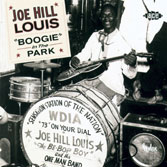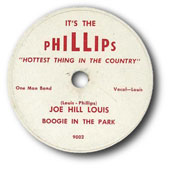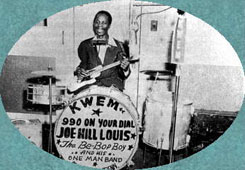 Throughout the history of blues, and its many practitioners, the one-man-band is a relative anomaly. A few come to mind; Doctor Ross, Juke Boy Bonner, Jesse Fuller, Harmonica Frank Floyd, and Joe Hill Louis, who was influential enough to impact one Blind Joe Hill, a relative unknown that recorded a fine LP for the Barrelhouse label in the late 70's. There are still a few carrying on the tradition today, and those who do, follow in the footprints left by the aforementioned artists. Joe Hill Louis was born Leslie Hill in September of 1923 in Raines, TN, hit the road at the young age of 14, wound up in Memphis where he found work as a gardener/house assistant, for the wealthy Canale family, and later for a vending company owned by Drew Canale, who went on to become a Tennessee Senator. By 1949, Joe Hill was playing in Handy Park raising a ruckus as a multi-instrumentalist with his guitar, harp, and drumset. Louis' initial recording date was for the Columbia label, the only release on a major imprint, while the remainder of his output later came on small independents like It's The Phillips, Sun, Checker, Meteor, Modern, and Big Town. He also landed a short, 15-minute daily spot on WDIA, a radio station out of Memphis, as The Pepticon Boy, and KWEM boasted his presence as well. This 78-minute CD on Ace features a well-stocked menu of 28 tracks, detailed liner notes by John Broven and Dave Sax, rare label photographs, plus a lengthy transcribed interview from Sam Phillips, all focusing on Joe Hill Louis. Most of the tracks were cut at Phillips' location, the Memphis Recording Service, while a handful come from other sessions.
Throughout the history of blues, and its many practitioners, the one-man-band is a relative anomaly. A few come to mind; Doctor Ross, Juke Boy Bonner, Jesse Fuller, Harmonica Frank Floyd, and Joe Hill Louis, who was influential enough to impact one Blind Joe Hill, a relative unknown that recorded a fine LP for the Barrelhouse label in the late 70's. There are still a few carrying on the tradition today, and those who do, follow in the footprints left by the aforementioned artists. Joe Hill Louis was born Leslie Hill in September of 1923 in Raines, TN, hit the road at the young age of 14, wound up in Memphis where he found work as a gardener/house assistant, for the wealthy Canale family, and later for a vending company owned by Drew Canale, who went on to become a Tennessee Senator. By 1949, Joe Hill was playing in Handy Park raising a ruckus as a multi-instrumentalist with his guitar, harp, and drumset. Louis' initial recording date was for the Columbia label, the only release on a major imprint, while the remainder of his output later came on small independents like It's The Phillips, Sun, Checker, Meteor, Modern, and Big Town. He also landed a short, 15-minute daily spot on WDIA, a radio station out of Memphis, as The Pepticon Boy, and KWEM boasted his presence as well. This 78-minute CD on Ace features a well-stocked menu of 28 tracks, detailed liner notes by John Broven and Dave Sax, rare label photographs, plus a lengthy transcribed interview from Sam Phillips, all focusing on Joe Hill Louis. Most of the tracks were cut at Phillips' location, the Memphis Recording Service, while a handful come from other sessions.
 Joe Hill Louis ran the entire gamut from being somewhat mundane at times, while most of his work shows a blistering attack that could be crippling. The lion's share of this set proves he was in strong form with heavily rhythmic guitar work, powerful harp accompaniment, driving backbeats, and a well-greased vocal approach. About half of what's here saw the light of day during his life, either as Modern or Meteor 78's, all now precious collector's items, while a good portion were issued in later years on numerous, now hard-to-find LP's (or expensive import CD's), and the balance of alternate takes compiled here make for a highly rewarding set.
Joe Hill Louis ran the entire gamut from being somewhat mundane at times, while most of his work shows a blistering attack that could be crippling. The lion's share of this set proves he was in strong form with heavily rhythmic guitar work, powerful harp accompaniment, driving backbeats, and a well-greased vocal approach. About half of what's here saw the light of day during his life, either as Modern or Meteor 78's, all now precious collector's items, while a good portion were issued in later years on numerous, now hard-to-find LP's (or expensive import CD's), and the balance of alternate takes compiled here make for a highly rewarding set.
From the opener, "Heartache Baby," one thing is clear, this is some rude and raw backwoods blues. The hand-clapped beginning of "Gotta Go Baby" leads to some rough, T-Bone influenced guitar work, and the jumping "Joe Hill Boogie" features another stripped-down shuffle. The full band backing for "Eyesight To The Blind" was a successful attempt in pairing Joe Hill's unorthodox style with a muscular outfit, and it could be Albert 'Joiner' Williams' two-fisted piano heard to great effect, as Williams did take part in other sessions for artists under the aegis of Sam Phillips, including his own. "Big Legged Woman" finds Louis in a setting that runs close to what Doctor Ross, a Sun labelmate, offered while recording for Phillips, and "Chocolate Blonde," with its errant, yet tasty harmonica, and even more erratic guitar work, steps aside for a lengthy session that certainly seems to be the crowning achievement in the Joe Hill Louis catalog. The instrumentals, "Twisting And Turning (On The Floor)," and "Boogie No.2 (Backslide Boogie)," both with tenacious harp and drilling guitar, first appeared as a pair of tracks credited to Howlin' Wolf on an ancient Crown budget-priced LP, and were from Louis' finest studio excursion, in 1953, although the exact location of where it was recorded remains unknown (I can still recall listening to the Crown LP a number of decades ago, knowing for certain this was not Howlin' Wolf). The blazing "Western Union Man," originally issued as by 'Chicago Sunny Boy' - perhaps for its similar, yet more propulsive Williamson-like attack, and the equally insistent "I Love My Baby," left a slew of researchers scratching their collective heads in an attempt to unravel the identity of this forceful performer. With overdriven guitar, Louis sang through the amplified harp rig, giving these sides, and a handful more, a decidedly nastier feel, all with a tongue-twisted vocal style, not unlike John Lee Williamson, and unless played next to the earlier unamplified sides, the Joe Hill Louis connection isn't immediately noticeable. Thanks to the ongoing efforts in blues research, another mystery was solved, rightly crediting Louis with this grinding session which resulted in his best work.
 The demise of Joe Hill Louis, at age 35, from a tetanus infection, took a highly original artist, but fortunately he managed to leave a fair representation of his work behind. He was fondly remembered by those who knew him, indeed Sam Phillips, who seems to feel he didn't work with Louis enough to bring his full potential to the record buying public. However, Phillips, and a few other label owners did think highly enough of Joe Hill Louis to work steadily with him, and in turn, generate the fine sides heard here. There are more unissued and alternate takes in the works, and hopefully, the forthcoming set, featuring a few others in addition to Joe Hill Louis, will have the same high standards as this import. Over the years, Ace Records' dedication to excellence has consistently brought together rare blues, exhaustive research, and top-shelf packaging, and that tradition continues with "Boogie In The Park," a disc that should receive a vintage reissue award, one of the top picks of 2001. For more information, the Ace website at: www.acerecords.co.uk offers this CD, and a slew of others.
The demise of Joe Hill Louis, at age 35, from a tetanus infection, took a highly original artist, but fortunately he managed to leave a fair representation of his work behind. He was fondly remembered by those who knew him, indeed Sam Phillips, who seems to feel he didn't work with Louis enough to bring his full potential to the record buying public. However, Phillips, and a few other label owners did think highly enough of Joe Hill Louis to work steadily with him, and in turn, generate the fine sides heard here. There are more unissued and alternate takes in the works, and hopefully, the forthcoming set, featuring a few others in addition to Joe Hill Louis, will have the same high standards as this import. Over the years, Ace Records' dedication to excellence has consistently brought together rare blues, exhaustive research, and top-shelf packaging, and that tradition continues with "Boogie In The Park," a disc that should receive a vintage reissue award, one of the top picks of 2001. For more information, the Ace website at: www.acerecords.co.uk offers this CD, and a slew of others.
 Simply click on the CD cover at left to order this CD NOW!
Simply click on the CD cover at left to order this CD NOW!
This review is copyright © 2002 by Craig Ruskey, and Blues On Stage at: www.mnblues.com, all rights reserved. Copy, duplication or download prohibited without written permission.
For permission to use this review please send an E-mail to Ray Stiles.

|